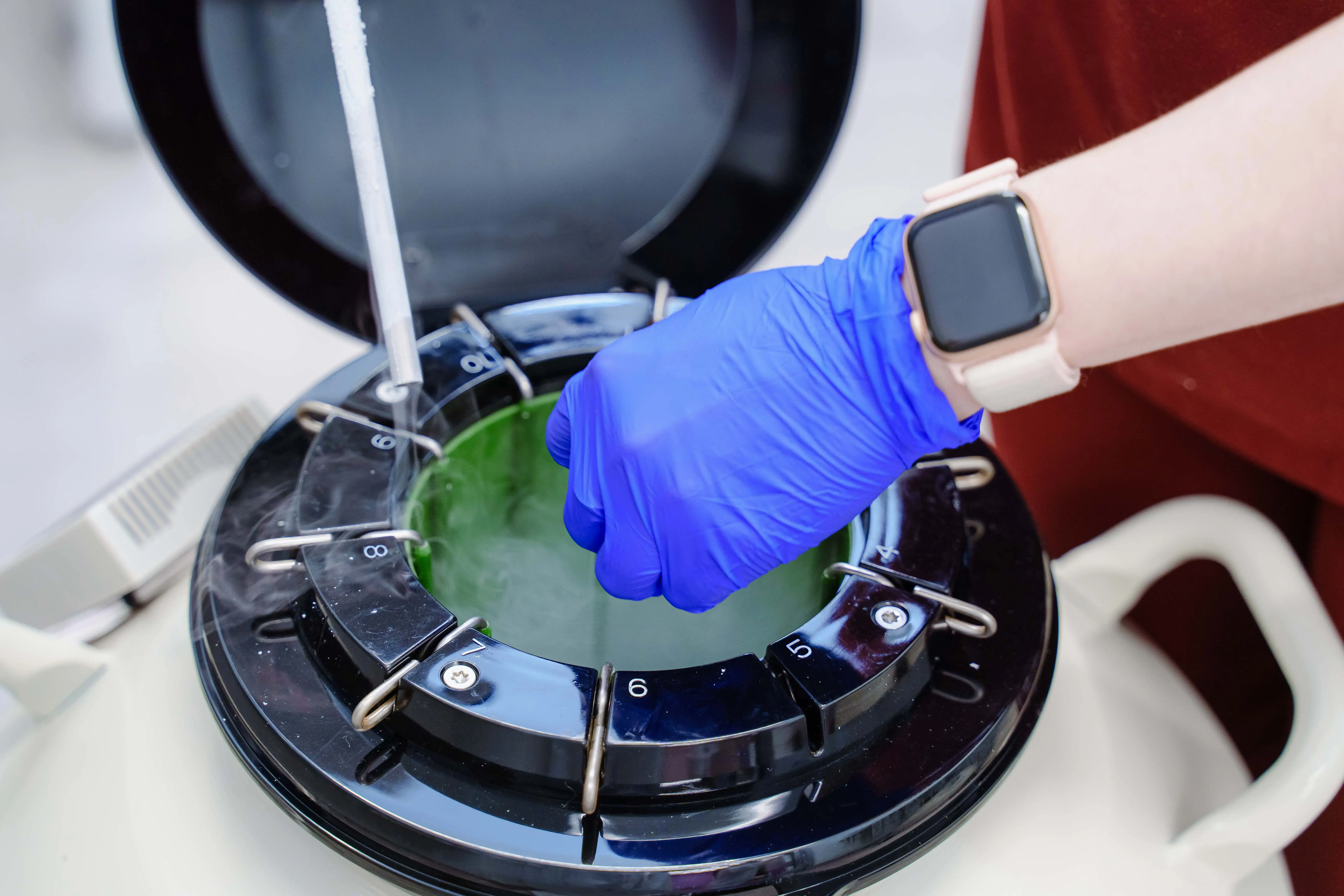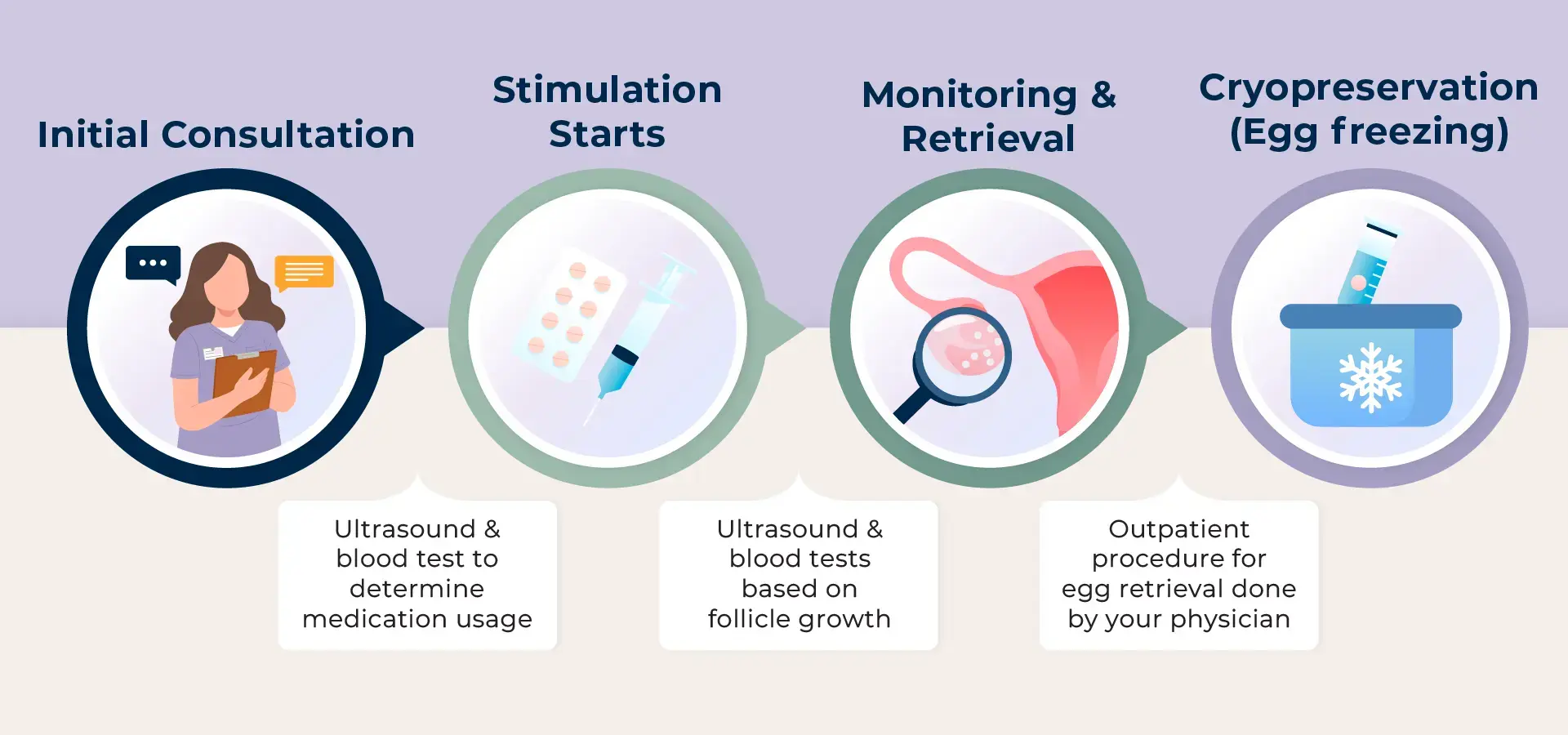Blogs
- Home
- Blogs
- Educational
- A Complete Guide to Egg Freezing
A Complete Guide to Egg Freezing
May 26, 2025Molly Chu Chen - Labryo Fertility
Educational1. What Is Egg Freezing and Why Should You Freeze Eggs?

(1) Introduction to Egg Freezing
Egg freezing, or oocyte cryopreservation, is a fertility preservation method where mature eggs are extracted, frozen, and stored for future use. It allows individuals to safeguard their reproductive potential, especially if they're not ready to start a family now due to career, medical conditions, or personal reasons.
Egg freezing rates in the USA have skyrocketed over the past decade, with the number of procedures increasing by over 40% in 2020! This rapid rise is mainly due to advances in freezing technology like vitrification, growing awareness about fertility preservation, and more companies offering egg freezing as a workplace benefit, empowering women to delay pregnancy while focusing on their careers.
(2) When Is the Best Time to Do Egg Freezing?
The ideal time to freeze eggs is in your late 20s to early 30s, when egg quantity and quality are at their peak. However, many women freeze their eggs in their mid-to-late 30s. Fertility specialists can help assess your individual situation using hormone levels such as AMH and antral follicle count.
While freezing eggs at a younger age usually offers higher success rates, life circumstances differ for everyone. Whether it’s health issues, career priorities, or personal reasons, it’s best to explore your options sooner rather than later. Measuring your AMH (Anti-Müllerian Hormone) level is a key step, as it provides a reliable estimate of your ovarian reserve. Getting an early assessment from a fertility expert, including AMH testing, can give you a clear picture of your fertility potential and help you make informed decisions before time runs out.
(3) 2 Types of Egg Freezing
There are two main types of egg freezing: elective (also called social) egg freezing for personal reasons, and medical egg freezing. Elective egg freezing is chosen by individuals who want to preserve their fertility such as focusing on their career, not having found the right partner yet, or simply wanting to delay pregnancy until they feel ready. This option gives people more control over their reproductive timeline and peace of mind about future fertility.
Medical egg freezing, on the other hand, is done for health-related reasons. It’s commonly recommended for patients about to undergo treatments like chemotherapy, radiation, or surgery that could harm their ovaries and reduce fertility. Freezing eggs before these treatments helps safeguard the possibility of having biological children later, providing hope during challenging medical journeys. Both types rely on the same freezing technology but differ mainly in the reasons behind the decision.
2. The Egg Freezing Process Explained
(1) Step-by-step: How Freezing Eggs Works

- Initial consultation and early examination
- Stimulation
- Monitoring and Egg retrieval
- Vitrification, a fast-freezing method to store the eggs safely
At Labryo Fertility Center’s IVF lab, we utilize cutting-edge vitrification technology for embryo and egg cryopreservation, ensuring the highest survival and success rates. This advanced flash-freezing technique prevents ice crystal formation, significantly improving post-thaw viability. As such, our lab boasts an exceptional recovery rate of approximately 98% for frozen eggs and embryos. Labryo Fertility Center has one of the best IVF labs in the United States.
(2) How Long Does the Egg Freezing Process Take?
The entire process typically takes about 2 to 3 weeks from the start of hormone injections to egg retrieval. Everyone’s egg freezing journey is different, so the exact duration of the procedure depends on each individual, with factors including medical history, medication usage, and goals. Some prep work, including blood tests and ultrasounds, may begin a week before stimulation.
(3) How Much Does It Cost to Freeze Your Eggs?
Costs vary by country and clinic. The average cost of freezing eggs in the U.S. ranges from $8,000 to $20,000 per cycle.
3. Egg Freezing Success Rates and What to Expect
(1) How Many Eggs Should You Freeze?
Determining the optimal number of eggs to freeze depends on several factors, including your age, egg quality, and how many children you hope to have. For someone in normal health and under ideal conditions, freezing 10 to 15 mature eggs is generally recommended to have a good chance of one healthy baby. This is because not all eggs will survive thawing, fertilize successfully, or develop into healthy embryos.
Key factors that affect this number include:
- Age – Egg quantity and quality decline with age, so older individuals may need to freeze more eggs.
- Egg quality and medical conditions – Conditions like PCOS can impact egg quality, response to stimulation, and embryo development.
- Your family goals – The more children you’d like in the future, the more eggs you may need to freeze now to improve your chances later.
But every case is special and we’d recommend having a consultation with our fertility specialist to help estimate the ideal number based on your reproductive goals.
(2) Does Age Affect Success Rates?
Yes. Age is one of the most significant factors. The younger you are when you freeze your eggs, the higher the chances they’ll result in a successful pregnancy later. Eggs frozen before age 35 generally have higher success rates.
(3) What Happens When You’re Ready to Use Your Eggs?
When you're ready to conceive, the eggs are thawed, fertilized in a lab (IVF), and the resulting embryo is transferred to the uterus. Not all eggs survive the thawing process, so freezing more eggs improves your chances.
4. How PCOS Affects Egg Freezing
(1) Does PCOS Make Egg Freezing Easier or Harder?
PCOS (Polycystic Ovary Syndrome) can lead to a higher number of follicles, which might result in more eggs retrieved. However, it also raises the risk of complications like OHSS (Ovarian Hyperstimulation Syndrome), requiring careful monitoring.
While having more follicles can seem like an advantage, not all eggs retrieved from PCOS patients are mature or high quality. Additionally, hormonal imbalances common in PCOS may affect how the body responds to fertility medications. That’s why egg freezing for PCOS patients should be carefully managed to maximize mature egg count while minimizing health risks.
(2) Managing Risks Like OHSS in PCOS Patients
To reduce the risk of OHSS, clinics may use tailored hormone protocols, lower doses, and close monitoring. Using a "freeze-all" strategy rather than immediate embryo transfer can also help minimize risks.
Beyond medication adjustments, lifestyle and diet can also play a supportive role in managing PCOS symptoms during the egg freezing process. Staying well-hydrated, eating a balanced diet, and maintaining a healthy weight can all contribute to a more stable hormone response and reduce complications. Open communication with your fertility team is essential to catch early signs of OHSS and adjust the plan as needed.
(3) Tips for People with PCOS Considering Egg Freezing
- Monitor hormone levels closely – Regular testing of hormones like estrogen and AMH helps track your body's response to stimulation and detect early signs of OHSS.
- Discuss customized protocols with your doctor – A personalized medication plan can lower risks and increase the chance of retrieving mature, healthy eggs.
- Maintain a balanced lifestyle to support egg quality – Healthy habits like proper nutrition, stress management, and regular exercise can improve overall reproductive health and support better outcomes.
5. How to Manage Stress During Your Fertility Journey

(1) Emotional Impact of Freezing Eggs
Freezing eggs can have a powerful and positive emotional impact. For many women, it brings a sense of control, relief, and empowerment - knowing they’ve taken a proactive step to preserve their future fertility. Studies have shown that elective egg freezing can significantly reduce anxiety about the ticking biological clock and the pressure to find the “right” partner quickly. It creates space to focus on career, personal growth, or simply wait until they’re truly ready for motherhood.
Unlike men, who produce new sperm continuously throughout life, women are born with a finite number of eggs that decline in both quantity and quality with age. Egg freezing offers women the ability to “pause” this decline - essentially freezing time. This option gives them more flexibility and freedom in planning their lives, without being bound by their biological timeline.
(2) Mind-body Practices to Support Fertility
Stress is a major factor that can negatively impact fertility, from hormone balance to ovulation patterns. While stress alone doesn’t cause infertility, chronic stress can make the journey feel heavier and more emotionally draining - especially when outcomes don’t go as planned. That’s why managing your mental well-being is just as important as medical care during egg freezing or fertility treatments.
If you're feeling overwhelmed, try incorporating simple mind-body practices like deep breathing, yoga, journaling, or mindfulness meditation into your daily routine. Talking to a counselor who specializes in fertility or joining a support group can also help you feel seen and supported. And remember: if something doesn’t go as planned, it’s not your fault. Fertility is complex, and setbacks are part of the journey. Be kind to yourself - you’re doing your best.
- Mindfulness and meditation: Reduce stress and improve emotional resilience
- Therapy or counseling: Talk through fears and manage expectations
- Gentle exercise and proper nutrition: Support overall health and hormone balance
- Support groups: Connect with others going through similar experiences
Taking care of your mental health is just as important as the physical steps in your fertility journey.
If you’re feeling overwhelmed or confused, you’re more than welcome to consult our physicians at Labryo Fertility Center. We’ll make sure you’re getting the most considerable care, and we vow to always put you and your goals first.
